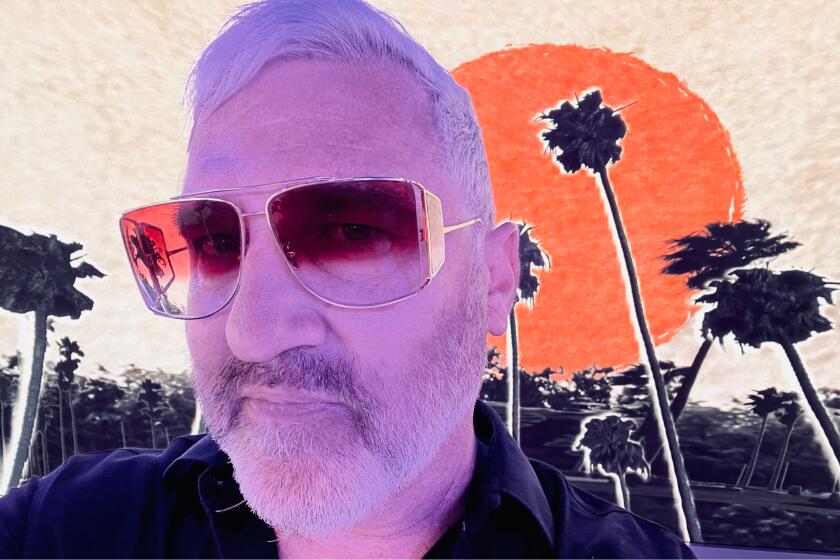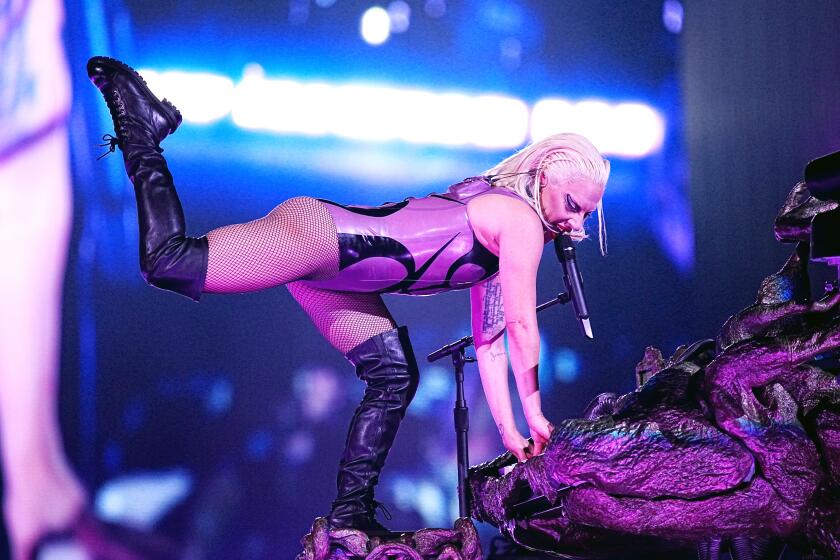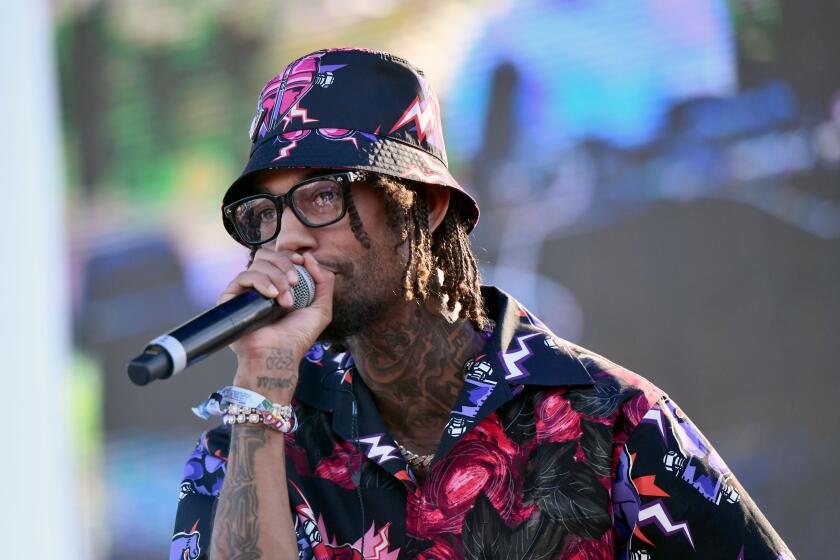Trauma, therapy and lambing: How Marcus Mumford turned torment into healing
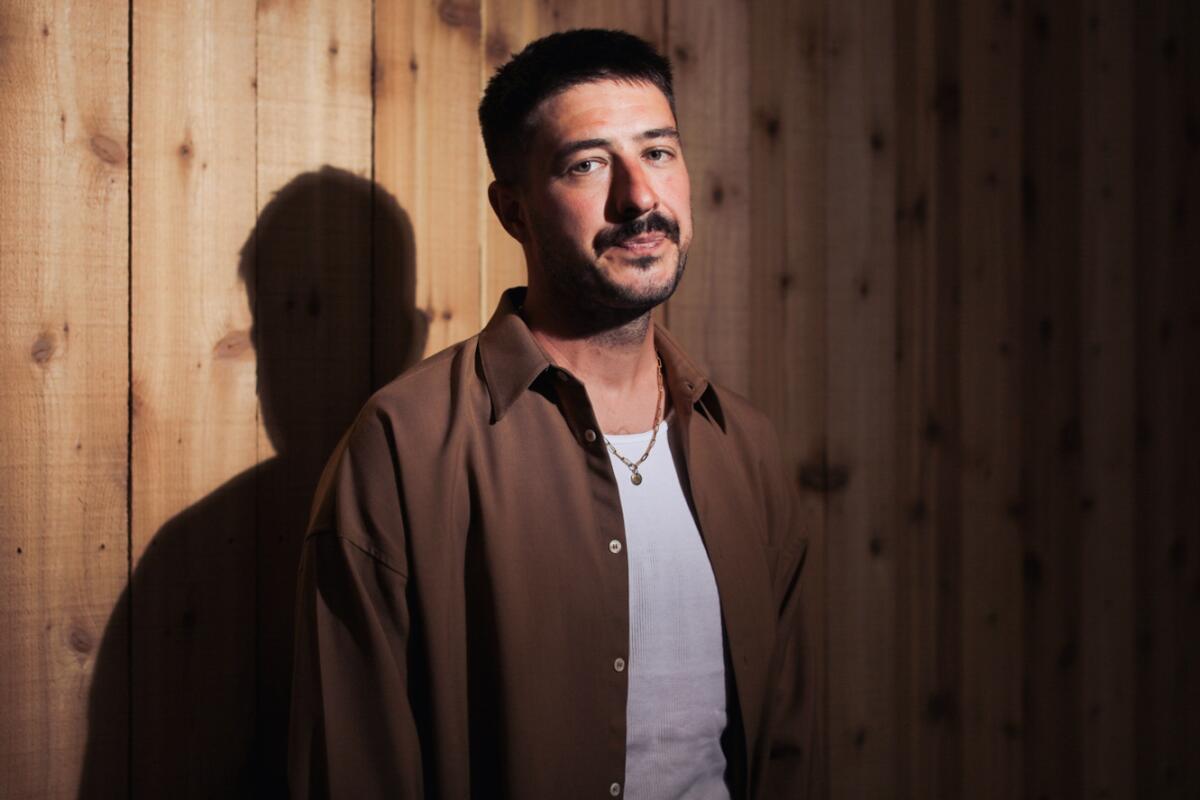
- Share via
Marcus Mumford opens his debut solo album with the most personal and straightforward — and probably the finest — song he’s ever released: “Cannibal,” a stark acoustic ballad (at least until it erupts with pounding drums and pealing guitars) about the sexual abuse Mumford endured when he was 6 years old.
“I can still taste you and I hate it,” he sings over a hushed beating-heart riff, his dry, papery voice as close as your own thoughts, “There wasn’t a choice in the mind of a child and you knew it.” The song — in which Mumford goes on to describe the toll of keeping his abuse secret for decades — is a startling achievement of emotional honesty from the 35-year-old singer and songwriter best known as the frontman of England’s foot-stomping, Grammy-winning Mumford & Sons.
But it’s not the only one on the deeply moving “(self-titled),” which Mumford made in Los Angeles with producer Blake Mills (a Grammy winner himself for his work with Alabama Shakes) and a crew of famous collaborators including Brandi Carlile, Phoebe Bridgers and Clairo. After “Cannibal” on the LP comes “Grace,” a jittery folk-rock jam that recounts Mumford’s playing “Cannibal” for his mom for the first time; other tunes ponder faith — both his parents are preachers — guilt and self-deception amid arrangements that lurch and glimmer in unexpected ways.
Mumford, who has two children with Oscar-nominated actress Carey Mulligan, sat down in a recording studio in Hollywood to talk about the album, due Friday, and the future of Mumford & Sons, whose banjo player Winston Marshall quit last year after being criticized for voicing a variety of conservative beliefs.
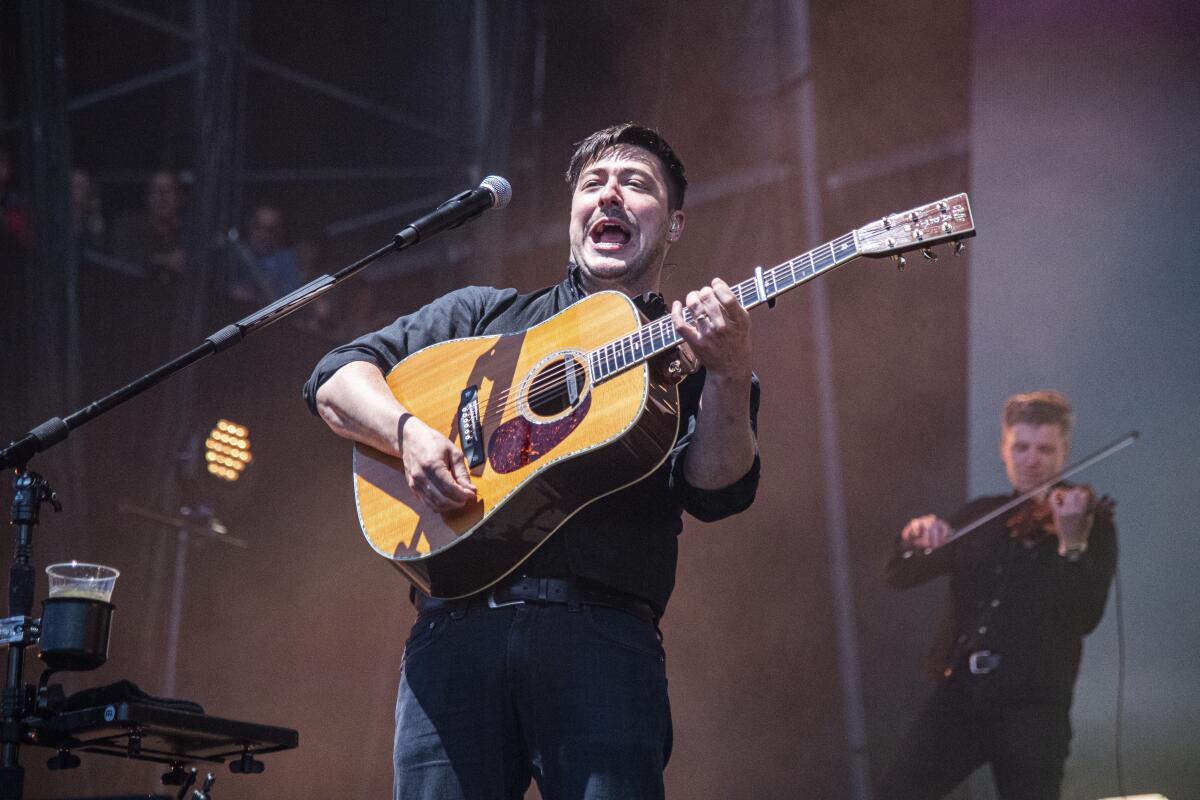
You’ve made a record about a painful experience that’s relatively uncommon —
Uncommon, you think? I’m starting to think it’s more and more common than any of us think it is.
But its significance means you’re being asked — after having written songs about it — to discuss the experience again in interviews. Does that seem like a terrible fate?
No. Writing the songs felt like a natural part of the process for me as an artist who processes things through writing songs. Now, the first time I told the story amongst my community — my friends and my family — it was full-blown PTSD. Vomit, breathing, all that stuff. But the point of trauma work is to be able to tell the story without reliving it. So by the time “Cannibal” came out, I’d already done the work. It’s not hugely emotionally charged for me at this point, and I don’t think I’m kidding myself with that.
You sing about forgiving your abuser in the album’s closer, “How.” As an outsider, it feels almost impossible to understand your ability to get there.
I really, really believe in healing. I really believe in recovery. And I believe in it because I’ve lived it. But I don’t think it’s one and done. It’s left-foot/right-foot, Aristotelian-type virtue stuff. If you want to be honest, you practice honesty, and if you want to be healed, you practice healing. That’ll be a process I’m in for the rest of my life, which is fine because it’s much better than the alternative. But that’s why it’s not wrapped up in a bow in the music. The lyric in “How,” it’s not like, “It’s all good — I forgive you.” At the beginning of the record, I say, “If I could forgive you,” and at the end it’s “I will.”
Not any bar, but his: The Afghan Whigs leader co-owns a handful around L.A. On the eve of a new album, he talks vices, socialism and mourning his friends.
The first time I heard “Cannibal,” I obviously didn’t know it was going to explode at the end. But every time I’ve heard it since, that knowledge has colored my experience of the song.
What does it make you feel?
I think it makes it slightly easier to go along with the narrator because you know catharsis is looming.
That’s why I felt it was important to get “Grace” out quite quickly after “Cannibal.” “Grace” starts out: “Well, how should we proceed / Without things getting too heavy?” The demo for “Grace” was called “I Just Want to F— Around,” because it’s like, OK, that’s done now. Hopefully it represents some of the freedom and playfulness that has come despite this — and that I do believe comes in people’s lives despite whatever they go through.

What was the response among the people in your life to a recent GQ article in which you spoke publicly for the first time about your abuse?
I got more messages directly to my phone than I have for anything since we headlined Glastonbury. Some of them surprised me: “Are you OK?” I wouldn’t have put the song out if I wasn’t OK. Then I’ve had a lot of responses of people telling me about their own stuff.
Are you open to that?
I normally say, like, “Thank you for sharing that, because it takes some effort to share it.” I don’t feel responsible for any kind of particular response, though I do think it presents a new challenge, one I’d spent some time thinking about already. And one I asked for help on from some people who know much better than I do. The lyrics on the record, I went through each one with a trauma specialist.
To what end?
Well, I’m not a terrorist. But at the same time I’m an artist who wants to reflect reality in my songs. So we went through it all and, actually, they felt there were no problems.
No triggers.
Effectively. They use the word “activation” now instead of “trigger.” In a lot of trauma work it’s about: What are you responsible for and what are you not? And the main piece of advice I took on that was from an interview of Beyoncé’s, which was to always leave people with hope at the end of every record. I felt like I could try and achieve that because that was the reality of my situation.
On Saturday at Dodger Stadium, Lady Gaga finally performed her pandemic-delayed Chromatica Ball concert, conveying vulnerability amid the grandeur.
Were women’s voices something you knew from the beginning would be an important part of this album?
It was intentional but it wasn’t calculated. Honestly, I’ve worked in a male-dominated environment for such a long time that it was a relief. I leaned a lot on Lucy Dickins, my agent; Jody Gerson, my publisher; Michelle Jubelirer with my label. And my wife, which is why the record’s dedicated to her. The feminine energy going into it was more present than it ever had been, and I found that every time I hit a brick wall, it was a woman who came along and helped lift me over it. I played Brandi the first two songs and she put her arm around me and said, “Dude, whatever it takes to help get this out of you, I will do.”
Actually, Elton [John] did the same thing within the same 24-hour period. We went out for dinner, and they both were like, “We haven’t seen you since COVID and now you seem really different.” I said, “Well, there have been some changes, and I’ve written some songs about it.” That night I drove Elton home and played him the first two songs in the car. And up until that point he’d been like, “Darling, whatever you do, don’t do anything else outside the band. You’ve got to keep the band together at all costs.” I played him those two songs and he said, “This is definitely going to be a solo record.”
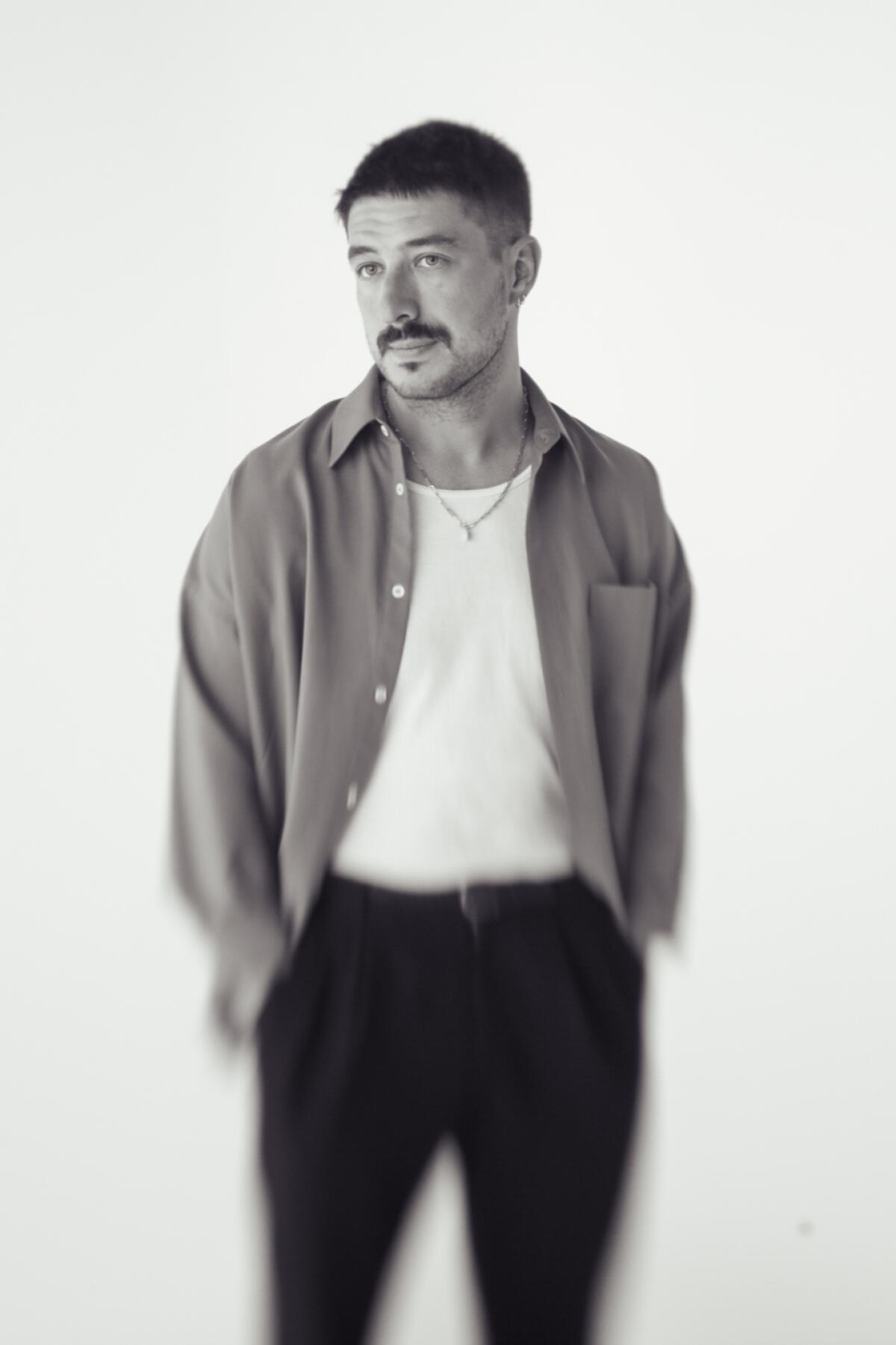
Does this project feel fundamentally different from Mumford & Sons?
It does. I worked harder on the craft of this record than I ever have in the band. There’s a spirit in the band, which has always been: Let’s just try and get down versions of the songs that will act as advertisements for our live show, which is where it’s really at. I said that to Neil Young once, and he was like, “Nah, mate — you got it all wrong.” And now I think he was right.
What I’d want is that the band could represent to me the same creative curiosity that the making of this record felt like. We haven’t gotten in a room and written music together again yet, so I don’t know if it can. But there’s so much I love about Ben [Lovett] and Ted [Dwane] and playing with them. I’ve got a bunch of songs I want to show them, and hopefully it’ll be a better creative engine than it has been in the past.
Winston’s departure created a certain messiness, though. There are people who are turned off Mumford & Sons because of his admiration for right-wing provocateurs like Andy Ngo and Jordan Peterson.
And there are people turned off by the fact that he’s not in the band anymore.
Is that messiness a burden to return to?
I feel like we’ve dealt with a bunch of it. I don’t feel the need for band statements. You start writing band statements, you’re gonna write a hundred of them in a year at a time like this. Musicians are terrible spokespeople. It’s not what you want.
What is lambing? The GQ story said you do it at your farm at home in England.
Lambing is when you help ewes deliver their young. It’s a verb: I lamb, you lamb, we lamb. There’s all these amazing words in Devon, where we live. Tedding is when you cut the hay in the field and you turn it so that one side dries in the sun.
You’re really about that farm life.
I think it’s helpful to have things that completely distract your brain from the thing that you do. And I spend so much of my time working in cities that when I’m not working for a long period of time — and if Carey’s not working for a period of time — we like to be in the countryside.
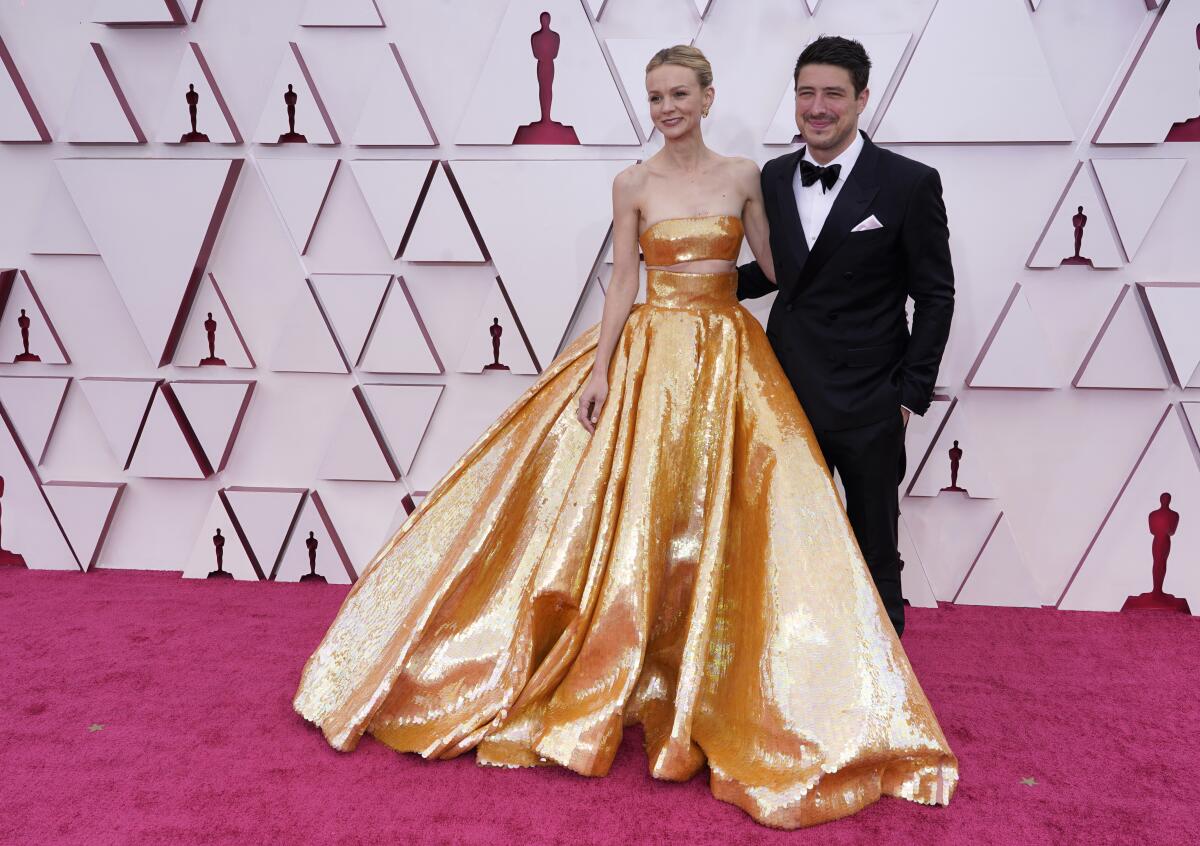
You and your wife met at church camp when you were 12, long before either of you were famous. Would you ever have pictured yourself married to a movie star?
No way. That was never in my head. When we got together, I think we recognized in each other the kind of person that we’d been, that we’d so enjoyed as kids that we’d written letters to each other and stayed in touch outside of camp. So we instantly were like, “Oh, I know you.” The fact that we both do this other stuff, I’m sure it helps us relate, connect, whatever.
Fair to say that, prior to the two of you reconnecting, you would have gone out of your way to avoid some kind of Hollywood hookup?
I was a fat kid from London. No starlets were knocking down the door.
Philadelphia rapper PnB Rock was fatally shot at a Roscoe’s Chicken & Waffles on Tuesday during a robbery. The hip-hop world paid tribute.
You’ve spoken recently about struggling with addiction.
Did I use that language? I’m not sure I used “addiction.” I think I used “addictive behaviors.”
But you’ll be back on the road soon with all its temptations.
I’m stoked about doing that with a bit more control. It’s not daunting to me because I feel like I know myself better. And I’m not so binary in my view of addiction anymore. I think addictive behaviors are like faders on a mixing desk. Whenever something’s too high in the mix, it dominates everything else.
Do you drink at all now?
I just haven’t. It felt like low-hanging fruit for me because I was able to stop before I had to stop. I didn’t require the 12-step stuff, so in that sense I guess I probably could drink. But everything in my life has got better without drinking, so I’m not in a rush to go back to it.
Last thing: Steven Spielberg directed his first-ever music video for “Cannibal.” Did you worry about whether or not your song was good enough to live up to that billing?
No. First off, it wasn’t like we had a list of famous directors that we went through and Spielberg said yes. He and [wife] Kate [Capshaw] heard the record and got it. And he’s just made this movie about his childhood and was in a period of time where it seemed like he really believed in art being a helpful tool in processing stuff.
So, weirdly — I mean, I get how strange this is — the video felt like the safest place to launch this record. In the room it was Steven; Kate; Kristie [Macosko Krieger], their producer; Carey and me. No production, no lights, literally a phone. Steven was like, “Man, I haven’t operated a camera in a while!” It was so intimate, and I felt so understood.
I generally hate music videos. Just feels like a weird concept. But I sent the cut to my folks, and my dad called me at 3 o’clock in the morning having watched it. He’d already heard the song a bunch, but the visual helped him process what the song is about. He was like, “OK, can we talk this through?”
More to Read
The biggest entertainment stories
Get our big stories about Hollywood, film, television, music, arts, culture and more right in your inbox as soon as they publish.
You may occasionally receive promotional content from the Los Angeles Times.
